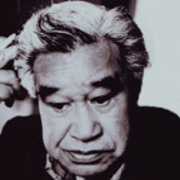
Hone Tuwhare
In 2007 publisher Craig Potton conducted a poll of New Zealanders' favourite poems, from any country or period. Hone Tuwhare's poem 'Rain' was the people's choice by a clear margin. Poet Alistair Te Ariki Campbell argued that Tuwhare introduced a "genuine, profound Māori dark note" into the country's poetry. His work also highlights working class concerns.
Born in 1922, Tuwhare grew up close to the Northland town of Kaikohe. His mother died when he was five; his father was an accomplished orator and storyteller. Encouraged by poet RAK Mason, Tuwhare began writing during a five-year apprenticeship at Auckland's Ōtāhuhu railway workshops. His first poems were published by Listener editor Noel Hilliard.
Hilliard and Mason encouraged Tuwhare to put together a poetry collection. No Ordinary Sun (1964) was the first book of poetry by a Māori writer in English. The first printing sold out in ten days. Anti-nuclear poem No Ordinary Sun became an emblem of the peace movement. In 2004 it inspired the title of this evocative short film by Jonathan Brough.
Many of Tuwhare's poems are a lyrical response to nature and the landscape, exploring a Māori connection to the whenua. His concern with landscape is clear in Eel. Originally written as a feature, Tuwhare's script ended up being refashioned into a half-hour episode of Māori series E Tipu e Rea (1989).
The anthology series marked a breakthrough in that it showcased Māori-driven narratives and talent. Eel marked the first drama directed by newsreader and future Māori Television executive Joanna Paul-Robie. Set in a 1950s rural community, it chronicles the relationship between an ailing war veteran and his 13-year-old nephew. Tuwhare based his screenplay on short story 'Taniwha', which first appeared in his 1978 collection Making a Fist of It.
Some of the story's elements were revisited in both Tuwhare's play In the Wilderness Without a Hat, and 1990 short story Don't Go Past Me with Your Nose in the Air. Māori screen taonga Don Selwyn directed a stage production of the former, and in 1991 turned the later into a short film, under the slightly shortened title Don't Go Past with Your Nose in the Air. It was named Best Foreign Short Film at the 1992 New York Festival.
Tuwhare also took a rare cameo role in forgotten ghost movie The Returning (1990). He played a grandfather, and joked that "people are going to love seeing me come out of church".
Tuwhare has featured in a number of documentaries. He talked about many of his influences in this 1975 interview, and was profiled for this 1981 episode of Koha. In Gaylene Preston's documentary Hone Tuwhare (1996) — sometimes known as No Other Lips: Hone Tuwhare — he talks about his early writing and collaborations with artist Ralph Hotere, and the influences of landscape and death.
Later director Michelle McGregor approached Tuwhare about making a short film based on one of his poems. McGregor ended up accompanying Tuwhare on a tour of Northland, after Glenn Colquhoun used a poem to ask him to return north. The result was Hone Tuwhare - The Return Home, which played to sellout audiences at the 2004 NZ Film Festival.
Tuwhare also features in this documentary about photographer Ans Westra, and in this 2010 film about poet Sam Hunt. He pays tribute to Ralph Hotere at the close of this film. Tuwhare's most famous poem inspired Maria-Elena Doyle's 2007 short film Rain.
Tuwhare's poetry has also inspired an eclectic range of musicians. Arts organisation Toi Māori Aotearoa commissioned musician Charlotte Yates to produce 2005 album Tuwhare, based on Tuwhare's poems. In 2022 The Rodger Fox Big Band used jazz to mark the 100th anniversary of Tuwhare's birth. Each project involved an album, concerts, and a long list of composers. Short film Tuwhare featured in both the album launch and performances of the earlier project.
During this period Tuwhare was named New Zealand's second Te Mata Poet Laureate, and got an honorary Doctor of Literature from Otago University. He later received another from Auckland University, and in 2003, an Arts Foundation of NZ Icon Award.
Tuwhare lived much of his later life in a seaside cottage at Kaka Point, south of Dunedin. He died on 16 January 2008, at the age of 86.
For more about Hone Tuwhare's life and writing, please go to this profile by Janet Hunt (who wrote 1998 book Hone Tuwhare: A Biography), or website Read NZ / Te Pou Marama.
Moe mai e te rangatira, moe mai.
Profile updated on 5 April 2023
Sources include
Maraea Rakuraku, 'E Tipu e Rea - Taking hold of the narrative' NZ On Screen website. Republished 22 May 2017. Accessed 21 December 2022
Unknown writer, 'Tuwhare, Hone' Read NZ Te Pou Muramura website
E Tipu e Rea press kit
'Rodger Fox Big Band Plays Hone Tuwhare' Rodger Fox Big Band website. Accessed 21 December 2022